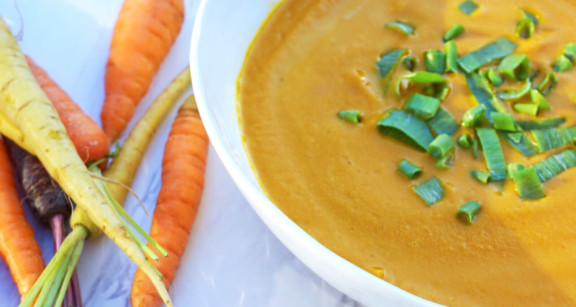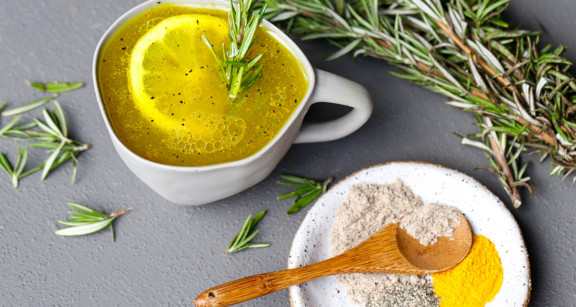Ginger
You’ve probably already cooked with it many times. Ginger is one of those spices that tastes as good in curries as in cookies. But do you know what else ginger can do beyond adding a tasty zing to your dish? This unassuming root plant, with its knobby exterior and fiery, aromatic kick, lists a surprising number of potential health benefits.
Over the centuries and throughout the world, ginger has been used to treat various health conditions as a natural remedy. It contains a bioactive compound called gingerol, which has antioxidant and health-related benefits.1
Read on to learn everything you need to know about ginger, the science-backed benefits of ginger, the Bulletproof approach to ginger, new ginger recipes to try and common FAQs.
What is Ginger?
Ginger is a versatile and widely used spice derived from the root of the Zingiber officinale plant. This plant comes from the Zingiberaceae family, which includes other well-known spices like turmeric and cardamom. It’s native to Southeast Asia but is now cultivated in many parts of the world. This spice has a distinctive flavor characterized by its spiciness and slight sweetness.
What is Ginger?
Ginger is a versatile and widely used spice derived from the root of the Zingiber officinale plant. This plant comes from the Zingiberaceae family, which includes other well-known spices like turmeric and cardamom. It's native to Southeast Asia but is now cultivated in many parts of the world. This spice has a distinctive flavor characterized by its spiciness and slight sweetness.
Stomach Soothing

Immune Support
Ginger’s immune supporting properties can help the body’s natural defenses against illnesses..[3]
Heart Health Support
Some research suggests that ginger may support heart health by influencing certain risk factors. However, findings on other markers have been mixed, and more research is needed to confirm its overall impact.[4]

Antioxidant Support
Gingerol, a key compound in ginger, has antioxidant properties, meaning it helps combat oxidative stress in the body. This may support overall well-being, though more research is needed to understand its full effects.[5]
The scientific research on ginger’s many benefits continue to this day. Read on to learn about recent studies on ginger’s exciting potential.
The Science-Backed Benefits of Ginger
Nausea
One study explored the efficacy of ginger in helping with nausea and vomiting in children suffering from gastrointestinal issues’ [6] Researchers were able to confirm, through clinical trials, that ginger is able to help lower the likelihood of throwing up. Since ginger is widely available and inexpensive, it is a great natural remedy to have on hand.
Digestion
Another study concluded that supplementing with ginger may help to promote the species’ number of intestinal flora in healthy adults.8 The study used fresh ginger juice as a supplement to investigate the changes in microbiota composition. As gut health becomes increasingly popular as an area of research, ginger potential has an important role to play in supporting digestion.
The Bulletproof Approach to Ginger
At Bulletproof, we want to help you get the most out of your supplements. That’s why we formulate blends that go above and beyond what you’ll find on your typical supermarket shelf. We want to make it easy and convenient for you to target specific health needs and feel your best, every day.
Although ginger can be easily included in many recipes, it’s not always easy to find the time to cook. Having a backup plan, like supplements, to help you get your daily dose can be a great way to help you stay on track with your health goals.
Spotlight on Ginger
Our ginger supplements not only include the powerhouse root, but we’ve matched it up with turmeric to maximize its effects. We offer both a turmeric supplement with ginger and turmeric gummies with ginger, to help you support overall health. Think of these supplements as added tools to improve your body’s resilience to stressors.
Ginger has traditionally been used to support healthy joints.9 It is a powerful herb that can naturally support mobility and joint comfort for your active lifestyle. Try it the next time you have a particularly challenging gym session or after a long run. Your body will thank you for it.
Our Supplement Testing Standard
From ingredient sourcing to lab testing, we take our time when it comes to making sure we’re formulating the highest-quality products. Our supplements are no different. We work with third-party labs for objective results that help us make informed decisions on effective formulations.
Our supplements go through four stages of rigorous testing to make sure they are safe and effective. The first step is to make sure the stated ingredients are present in the product and not diluted. The second stage involves testing for purity, to ensure there are no harmful contaminants present. The third stage consists of making sure the product has the right amount of active ingredients. And finally, the last step looks at the product’s composition, to ensure it matches what it stated on the label. Although these testing protocols are time-consuming, they help us produce safe, effective and accurately labeled supplements you can count on.
Ginger Recipes
Explore some of our favorite recipes that include ginger as a star ingredient. Make sure to incorporate them into this week’s meal planning to get your dose of this powerhouse spice.

Lemon Ginger Low-Carb Donuts

Cleansing Ginger Carrot Soup

Keto Lemon Ginger Coconut Popsicles

Cardamom Ginger Bone Marrow Broth

Creamy Keto Chicken Soup

Keto Paleo Gingerbread Cookies

Carrot Cake Collagen Muffins With Cashew Icing

9 Paleo Pumpkin Spice Recipes Because It’s Finally PSL Season

Ginger-Mint Green Tea Cooler
Learn More About Ginger
Ginger Articles
16 Ideas for Delicious Bulletproof Coffee Hacks
How to Strengthen Your Immune System Naturally
How to Stock a Healthy Pantry with Long-Lasting Staples, Plus Recipes
FAQs
One common side effect if you eat too much ginger is digestive discomfort. This potentially translates into heartburn, stomach upset or diarrhea. If you consume ginger raw in large quantities, it may cause mouth and throat irritation. Overall, side effects are typically mild.
Yes, ginger help with motion sickness symptoms. Ginger has been used for centuries for motion sickness and several studies have supported its use.11 The active compounds in ginger, such as gingerol and shogaol, are believed to help with nausea, including that which comes with motion sickness.
Yes, some. One notable interaction is with blood-thinning medications like warfarin (Coumadin) and antiplatelet drugs. Ginger contains natural compounds that can have mild antiplatelet effects, which means it may increase the risk of bleeding when taken alongside these medications. Ginger also has the potential to affect blood sugar levels, so combining it with diabetes medication may lead to low blood sugar (hypoglycemia). Additionally, ginger may interact with certain blood pressure medications and heart medications, affecting their absorption and effectiveness. If you’re on any medications, discuss ginger consumption with your healthcare provider to ensure that it is safe and compatible with your prescribed treatments.
Yes, powdered ginger still offers many health benefits, although it may have slightly different properties compared to fresh ginger. Powdered ginger is made by drying and grinding fresh ginger root, resulting in a concentrated form of the spice. While some of the water-soluble vitamins and compounds in fresh ginger may be reduced during the drying process, many of the beneficial bioactive compounds and flavor components are still present. Using powdered ginger can be an excellent way to enjoy the benefits and flavor of ginger when fresh ginger is not readily available or convenient.
First choose a fresh, firm piece of ginger with smooth skin. You can keep it in the refrigerator to extend its storage life. Place the ginger root in a resealable plastic bag or an airtight container to prevent moisture loss. For added protection, you can wrap the ginger root in a paper towel before sealing it in the bag or container. This helps absorb excess moisture and prevent mold growth. Stored this way, ginger root can typically last for several weeks in the refrigerator. If you have a larger piece of ginger, you can also freeze it. Simply peel and slice the ginger into manageable portions, place them in an airtight container or freezer bag and store them in the freezer for several months. When needed, you can grate or slice the frozen ginger directly into your recipes without thawing.
Look for products that contain pure ginger extract or ginger root powder as the primary ingredient, free from excessive fillers or additives. Seek supplements that are standardized to contain specific active compounds like gingerols to ensure consistent potency. Opt for reputable brands that follow good manufacturing practices and undergo third-party testing for quality and purity. And lastly, consider the supplement’s form and recommended dosage to align with your preferences and needs.